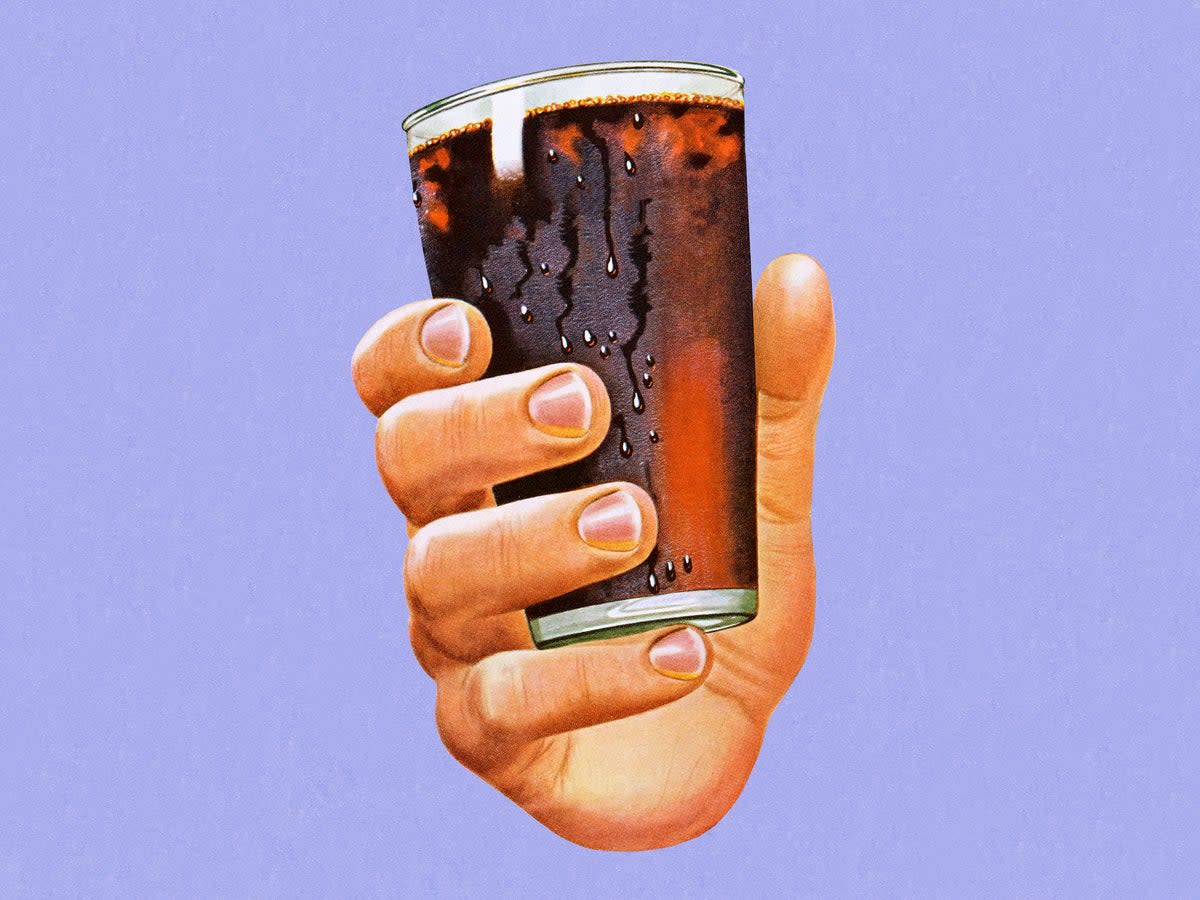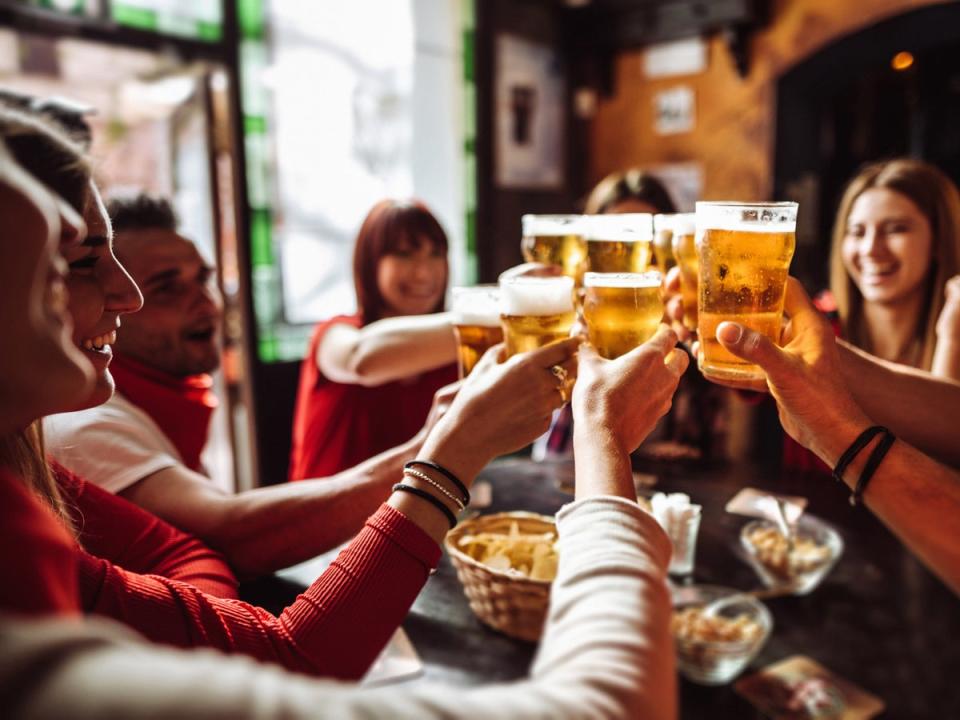‘I decided to stay sober forever’: How Dry January is changing binge Britain

Everyone who knows me knows I like a drink. I’ve worked in wine bars, adore lethally strong cocktails, and pubs are pretty much my favourite places. But this Christmas I found myself yearning for a break from booze. “I actually can’t wait for Dry January,” I texted my boyfriend on Boxing Day, and again the day after.
I’m not alone. Since 2017, the popularity of Dry January has seen a sharp increase year on year, peaking in 2021 (possibly aided by the winter lockdown removing any temptation to hit the pub). Even though the number of people taking part in the challenge dipped last January, social media analytics company Brandwatch found that online mentions of non-alcoholic beverages continued to surge throughout 2022, suggesting more people are taking to non-alcoholic drinks – and not just due to abstinence challenges, either. Since 2019, online interest in giving up alcohol entirely has been growing. In fact, a recent survey commissioned by SENTIA highlighted how four in 10 UK adults have already cut out alcohol, or are at least attempting to. Fifty-nine per cent cite health as the primary consideration. So, has the popularity of Dry January over the last few years spurred on a broader “sober-curious” movement?
What is certain is that people are right to be concerned about the effect drinking might be having on their health. Fitness and nutrition expert Penny Weston runs an online wellness platform called Made on Demand. She tells me how, even in the short term, “alcohol can affect mood, appetite, weight, libido, as well as cause a spike in insulin levels which are like those caused by poor diet”. Over a long period, this can have severe effects. “What we eat and drink is extremely important in maintaining good cognitive function and protecting us against conditions such as diabetes and Alzheimer’s.”
Dr Jamie Brosch, a GP and medical adviser at Goodbody Clinic, stresses that long-term heavy drinking can also “damage your heart, arteries and blood vessels – this leads to cardiovascular disease”. And the dangers don’t end there. Dr Gill Hart, biochemist and scientific director at YorkTest, stresses that “alcohol can also have a profound impact on our immune system, with 70 per cent of our immune system found in the gut.” This can have a knock-on effect, reducing our ability to fight infections and increasing the risk of developing food intolerances and sensitivities. Even people who consider themselves moderate drinkers may be in more harm’s way than they think – Dr Hart underscores that “one in five of us drink alcohol in a way that could cause the liver harm”. With all these health risks being discussed now more than ever, it’s no wonder a growing number of people are turning towards a “sober-curious” lifestyle. As Dr Hart puts it, “having a break from alcohol is starting to sound very appealing!”
Chris Wharton is a mental health speaker, trainer, and the co-founder of SOBR.CO – a sober-curious supplement brand and community. As he entered his thirties, he found both the physical and mental effects of drinking worsened. Hangovers also became harder to recover from. “I’m not unfamiliar with the feeling of waking up hungover, lethargic, apathetic, and generally unmotivated after an evening spent socialising with friends,” he says. “Longer term I began to feel sick – poisoned, almost – after a heavy night of drinking.”
Having worked as a trainer and fitness and health expert for over 15 years, Wharton was conscious of the long-term damage alcohol can cause, but, he says, “for some reason we tend to view alcohol in a different light; as a harmless, and necessary social lubricant”. However, he realised that he was “having the same conversation over and over, either with clients, colleagues, or friends all being negatively impacted by alcohol consumption, and looking to reduce their intake.”
Not only does being sober help you save money, it gives you a remarkable mental clarity that I just didn’t have when I was contending with hangxiety every other week
“I feel like there is a massive shift on the horizon,” he continues. “Since Covid, people have become much more mindful of their health and its fragility. The number of alcohol-free options in pubs and bars has skyrocketed and the number of young people drinking heavily has plummeted.”
One of the things that has held me back from taking part in Dry January, or any other abstinence challenge, is the fact I have had a break from drinking before – it just wasn’t out of choice. Five years ago, I had surgery two days before Christmas, and couldn’t drink alcohol for six weeks. But rather than feeling cleansed and detoxified, spending Christmas and New Year sober and popping painkillers left me ravaged by fomo. I grew desperate to sink the first alcoholic beverage I could get my hands on when my doctor-enforced dry spell came to an end. Since then, I’ve had a sneaking suspicion that others who regularly take part in challenges like Dry January or Sober October may end up feeling the same. Can a relatively short period of abstinence really help change people’s habits in the long term?
Daniel Fincham is the founder of Recoverlution, an online platform for those recovering from addiction. He believes short-term abstinence challenges can spur long-term changes. “I think Dry January can be a great entry point into life-long sobriety if you’re sober-curious or are concerned about your drinking,” he says. “I think a lot of people would be surprised how much more of life they see and enjoy when they aren’t either drinking or hungover – and you don’t need to be an alcoholic to realise that.”
Fincham came up with the idea for Recoverlution while in the early stages of his own recovery. After searching for information and support online, he discovered there wasn’t a platform bringing together everything he was looking for in one place. Yet he feels that things are definitely changing. “When I was growing up,” Fincham says, “if you had an alcohol problem it was swept under the carpet. But now we’re seeing a lot of people in the public eye opening up about their issues with mental health and addiction. I imagine a lot of young people hear things like this and think, ‘actually, should I be questioning my own relationship with alcohol?’”
As a recovering alcoholic, Fincham knows a half-in, half-out approach to alcohol doesn’t work for him. “There is never going to be a safe way for me to consume alcohol. That said, there are some people who don’t feel they need to give up alcohol completely, but do want to have a healthier relationship with it.” If this is the case, Fincham says there are many more options than simply going cold turkey. “Limiting the number of days per week you drink, only drinking beer rather than spirits, and having a soft drink between alcoholic drinks can really help if you want to cut down but not go completely sober,” he says. Ultimately though, Fincham himself has found “the long-term benefits of sobriety are endless”. He insists he’s “never heard anyone say they regret getting sober”.

Alexandra McRobert, known as “Sober Yoga Girl”, is a former party girl turned international yoga teacher and sober lifestyle coach, and host of the Sober Yoga Girl podcast. She also believes that periods of abstinence like Dry January “can be an absolutely amazing way to get curious about sobriety – without committing to ‘forever’.” Yet she admits that, in her case, this is exactly what ended up happening. “I did a 28 day challenge,” McRobert says. “It transformed my life in such a positive way, that I decided to stay sober forever – and never went back!” Now, McRobert knows “plenty of people who ended up sober the same way [she] did – by taking a break that turned into a lifestyle change.”
Sean Spooner is one of those people. He decided to try a short period of sobriety in January 2018, a few days after he turned 22. “A month passed, then 100 days, and before I knew it, I was approaching a year without drinking and saw no point in starting again. So I didn’t. Not only does being sober help you save money, remember more, and enjoy experiences for what they are, it gives you a remarkable mental clarity that I just didn’t have when I was contending with hangxiety every other week.”
For a lot of sober-curious young people, experiencing “hangxiety” – or a sense of dread after a night of heavy drinking – seems to be a common theme, perhaps even more so than concerns about physical health. A recent survey by TRIP found that while 29 per cent of UK adults have suffered from hangxiety in the past 12 months, for 18- to 24-year-olds the numbers are far higher, with nearly half reporting having experienced the condition. Of this age group, 45 per cent said that they experienced hangxiety over spending too much money – suggesting the current boom in sober curiosity might be linked to the current cost of living crisis, which is disproportionately affecting the UK’s young people.
I still love people and parties, [but] I no longer have anxiety. My choices are good, and I am so much happier
With extra financial pressures, perhaps it shouldn’t come as a surprise that many young people are deciding to ditch the emotional mood music of hangovers, for a more mindful and intentional lifestyle. Heather Suttie, for example, says she “used to suffer terribly with hangxiety and felt doomed for days after a night out”. After deciding to stop drinking for a while, she found the benefits were so clear she “just kept going”. She has now been sober for 11 years.
“I now have a better social life,” Suttie says. “I still love people and parties, [but] I no longer have anxiety, I have more money, better health, really great relationships with friends plus I’ve developed lots of new, meaningful relationships with friends and colleagues. My performance is better at work, my sleep is deep, my choices are good and I am so much happier.”
To all the “sober-curious”, she says, “don’t knock it ‘til you’ve tried it! And if you try it – enjoy it.” And, as she points out, cutting back “doesn’t have to be a big commitment. Change starts with small steps.”
I’d certainly raise a glass of non-alcoholic beer to that.


